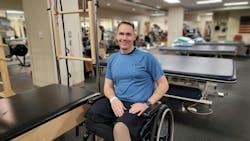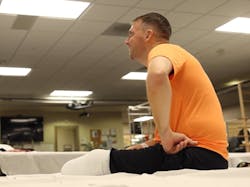Picking Up the Pieces: Md. Officer who Lost Legs Eyes Work Return
Patrick Kepp vividly remembers the car running him down on an early October 2023 evening. The Montgomery County, Maryland, Police Department sergeant never lost consciousness during the horrific collision that would take both of his legs.
This article appeared in the November/December issue of OFFICER Magazine. Click Here to subscribe to OFFICER Magazine.
Kepp had been deploying a spike strip across a section of interstate in an effort to stop a 19-year-old driver with a history of baiting police into dangerous high-speed pursuits. He could see the vehicle baring down on him, and he tried to scramble out of its path. But he couldn’t avoid the driver, who allegedly struck the officer on purpose.
“After I was run over and I kind of came to rest on the shoulder of the roadway, I quickly knew that something was wrong,” Kepp tells OFFICER Magazine in an interview. “I didn't know exactly what was wrong. I remember reaching down to my right leg—which was the one that had been traumatically amputated on scene—I remember reaching down and seeing blood, and I had some choice words for myself that I said very quickly.
“I’d lie If I told you I knew exactly what was going on.” he adds. “I knew something was wrong. I knew my leg was royally messed up, at least on the right side. I didn't have any idea particularly about the left side, but, I knew something was wrong.”
Along with the injury to his right leg, the crash also left Kepp’s left leg mangled. Miraculously, he escaped any traumatic brain or upper body injuries in the gruesome incident. Now after 10 surgeries, months of rehabilitation and learning how to walk on new pairs of prosthetic legs, Kepp feels close to returning to patrols.
“What I had was, yeah, the loss of parts of both of my legs,” he says. “But I was determined to come back to work … and be back to where I was before then.”
A driving ‘menace’
Ask Kepp, and he’ll tell you that the seeds of the Oct. 18 collision were planted months before, when he encountered Raphael Mayorga for speeding. That led Kepp to learning that Mayorga had had run-ins with numerous officers in his department, as well as other agencies.
“(This) driver was really a menace, trying to bait us into chases at extremely high speeds, lights off in the middle of the night, all kinds of just very, very reckless and dangerous driving habits,” he says.
On Oct. 18, Kepp had pulled into one of the district stations to catch some shut-eye in his car after his shift. He was set to go into Washington, D.C., the next morning to help with planned protests. Just as he had tilted his seat back, a call came over the radio about a vehicle baiting an officer in Clarksburg in northern Montgomery County.
“I didn't really hesitate and, kind of second nature, just threw the car into drive, got the seat up and went to get involved with it because I knew that we had to stop this person or at least try to or else he was going to kill somebody, is what we all believed,” says Kepp. “We had had communications and discussions between executives in the department, between our allied agencies that we've worked with, and the decision was that that night, we were going to try to stop him. So we had come up with a plan to try to stop him if we could. And that plan, ultimately, kind of ended or almost started to end when I was intentionally struck on I-270 at just before four in the morning on the 18th.”
Although Kepp has a vibrant memory of the crash, he can’t go into certain details while the case is pending trial. According to reports, Kepp was laying out spike strips when Mayorga allegedly targeted the sergeant and ran him down without stopping. He was finally apprehended further along the interstate when his car was disabled by spike strips deployed by another officer. Mayorga faces multiple charges, including attempted murder, assault, causing life-threatening injuries and eluding a police officer.
Immediately following the collision, Kepp assessed himself physically. Even though he knew he was severely injured, he felt his training take over.
“I think it was probably just muscle memory to get on the radio and try to stay as calm as I could and let people know that I needed them to come quick,” says Kepp.
“In my stubborn ways, with literally one leg half-amputated and the other just truly mangled, I was still trying to stand up and get up, which was obviously never going to happen,” he adds.
While Kepp recognized his training kicking in, it was seeing his colleagues’ training in action that impressed him. The first two officers to respond quickly applied tourniquets and took control of the situation. That didn’t stop Kepp, however, from trying to direct the first responders at the scene.
“I remembered some of the funny things that I said. Me, laying on the side of the road and still having my supervisor hat on, telling everybody to make sure that they shut down the road, which is just silly,” he says.
Kepp was airlifted to the University of Maryland Medical Center’s shock trauma unit in Baltimore. Once there, he recalls being prepped for surgery, listening to the nurses explain what was going to happen. These recollections might be a main line to a traumatic event, but Kepp doesn’t resent being reminded.
“I'm glad that I remember all that,” he says. “I think, as law enforcement officers, we’re very curious, and we're kind of immune to a lot of the negative stuff. So talking about it, seeing it, remembering it, all that is something that I've really wanted to do. And it's been I've been glad that I've been able to remember it and then see some of it on the back end.”
One of the most difficult conversations
Kepp was confronted with the loss of his legs following his first surgery. He suspected what had happened, and he kept delaying being formally told by the hospital staff.
“The realization that I had lost at least significant parts of both of my legs, that was still one of the most difficult conversations and moments probably in my life,” says Kepp. “I went the whole day from whenever I got out of surgery, which was late morning, early afternoon. I went that entire day until the nighttime, pushing it off. Nurses would come in, and I was like, I'm good. Let me be with my friends and family. Not pushing them away from helping me, but I just don't want to know, right? I know, stuff's bad, but I'm good right now. Let's keep going.”
Finally, Kepp’s doctor came in at the end of the day and broke the news to him.
“So that's when he came in that first night and told me that I had what I had pretty much known, that I had lost my right leg below the knee,” he says. “But then when he told me that I had lost my left leg below the knee, as well, that was a very, very, very difficult time for me. That was the most difficult conversation that I think we had.”
Other difficult conversations followed. But Kepp didn’t let himself fall into despair. He says he’s always tried to make it a practice of keeping the past in the rearview.
“This has happened. It is what it is. Now it's time to move on and figure out what's next and how I can move forward,” says Kepp. “That's just really how I've always thought. I don't like to dwell on the past and do what ifs and things like that. So for me, it was just moving forward from that point. And that's really what it's been through this whole recovery journey.”
That journey has meant nine other surgeries and a transfer to Walter Reed National Military Medical Center for rehabilitation. It has also meant tracking recovery milestones, big and small. From getting out of bed and into a wheelchair to starting physical therapy. The biggest breakthroughs came roughly two months after the incident. On Dec. 29, Kepp was fitted for his prosthetics for the first time, and he took his first steps with them Jan. 3.
“Once I really hit that milestone, I had no plans,” says Kepp. “You could have asked anybody. I don't think anyone would have said that I would have been up and starting to walk again by the beginning of January, when the crash happened on Oct. 18. I didn't really know what to expect, to be honest. So my expectations or my milestones or my goals, whatever, kind of —I don't want to say they didn't go away, because obviously my goals are still here—but that was really the big one, getting in the prosthetics and up and walking and each individual step after that was just something that kind of would get figured out.”
Since January, Kepp has been learning to walk again. And because he has different setups for his prosthetics, he’s had to learn how to walk and run three different ways.
A return to work
Kepp can’t say enough about the support he’s received through his challenges, whether from loved ones or the first responders and doctors who took care of him. One of the greatest sources of support has come from his department. Colleagues and supervisors have not only encouragement for his recovery, but also for his return to enforcement duty.
“Nobody said that. no, you can't, or no, we won't let you, or no, we don't want you back doing exactly what you were doing,” he says.
It helps that officers with prosthetic legs aren’t new to agencies. In 2020, a veteran who lost both his legs in Iraq graduated the Fort Worth, Texas, police academy, and this year, a Dayton, Ohio, police officer who lost a leg in the line of duty competed in fencing in the Summer Paralympic Games in Paris. As of early September, Kepp, who runs his department’s alcohol initiatives unit, has returned to light duty with an eye on soon returning to enforcement duty. For that to happen, he needs to feel comfortable doing field work with his prosthetics. He will also need to demonstrate that he can still perform the core competencies of the job.
While Kepp has felt supported when it’s come to returning to work, that doesn’t mean some family members haven’t been worried about the prospect. Why continue in law enforcement? Will he still be performing traffic stops along I-270 where he was struck? Kepp understands that questions like that come from a place of concern, and he’s done his best of navigating those sentiments.
“I've been able to really calm those nerves or just quell those thoughts of worry by saying that this is what I want to do. It's what I signed up to do. It's what I enjoy doing,” he says. “I love my work. I love the people that I work with. I love the department and want to be out there doing it. So as much as they may personally have a hesitation or they don't want me hurt or injured or anything like that, they support my decision in my process.”



